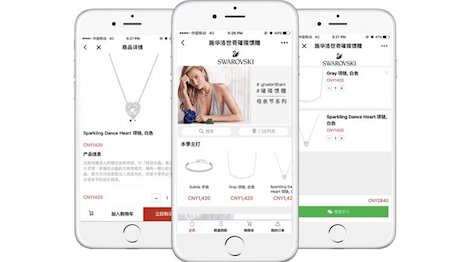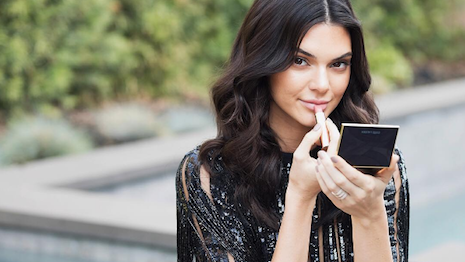
Chinese consumers have an affinity for Chanel. Image credit: Chanel
By Mickey Alam Khan
Four Seasons Hotels & Resorts, French fashion house Chanel and beauty marketer Estée Lauder secure the top brand spots in their respective fields in regards to relevancy among Chinese consumers, according to RTG.
The RTG consulting group has released its "Brand Relevance Report 2017," which shows that brands in China are becoming quicker to jump on growing trends, helping them to stay on top. Many Chinese brands are making waves overseas throughout all industries.
“This is an interesting time for brands,” said Marc-Oliver Arnold, chief strategy officer at RTG Consulting Group. “Brands are expanding and targeting up-and-coming niche trend markets, capitalizing on emerging trends to quickly head that sector - brands like adidas, WeChat and Huawei are key examples of the effectiveness of this strategy.
"To succeed, brands need to move at the speed of modern China’s cultures and subcultures," he said.
RTG Consulting Group surveyed 5,000 Chinese consumers as well as 45 China industry experts to come up with this data.
Chinese brand growth
Local Chinese brands such as YiLi, HLA and WeChat have seen significant growth worldwide in their respective sectors. Almost all industries within the report saw an increase in growth from Chinese brands.
 WeChat Pay will soon be usable with a variety of luxury brands in North America. Image credit: WeChat
WeChat Pay will soon be usable with a variety of luxury brands in North America. Image credit: WeChat
However, the luxury sector saw no growth in Chinese brands, but is being dominated by Chanel in China. For instance, Chanel was the most favorable luxury brand for Generation X and millennial consumers.
Generation Z chose Dior for their favorite luxury designer. Estée Lauder was the top brand for beauty.
Chanel scored a 7.3 and was followed by Dior, Valentino and Rolex as the top five luxury brands, in that order. Chinese affluent believe that Chanel is iconic and represents a high-class Parisian lifestyle.
Estée Lauder received a 7.5 score, with “consistent” listed as its highest scored attribute. Experts say its large-scaled campaigns featuring prominent celebrities support its relevance.
 Kendall Jenner for Estée Lauder. Image credit: Estée Lauder
Kendall Jenner for Estée Lauder. Image credit: Estée Lauder
Four Season was as the top of hospitality. The hotelier received a 7.6 on a 10-point scale for overall brand relevance. The score is based on unaided consumer responses and expert insight.
Germany's Volkswagen was ranked as the top brand for automotive, Audi was listed as the third.
Chinese market research
Affluent Chinese consumers are projected to make up to 44 percent of the global luxury consumption across the globe by 2025, according to another report from McKinsey & Company.
This would double their current level of spending to $147 billion (1 trillion yuan).
The consulting company, which issued a Chinese-language industry report on June 13, also expects the total market share of the global luxury market to reach $397 billion (2.7 trillion yuan) in 2025, which will be mainly driven by China (
see more).
Gift giving is common practice among the Chinese, but the rising percentage of high-net-worth consumers self-gifting can provide luxury brands with an opportunity to forge a personal and emotional connection.
According to Hurun Research Institute and MEC’s “China high-net-worth gifting” white paper report, 67 percent of affluent Chinese consumers self-gifted last year, with 74 percent of females buying presents for themselves. Although gifting for family members is most common, with nearly 100 percent of those surveyed sending their kin gifts, self-gifting in China is trending as it fits with “little but certain happiness” and “love and pamper myself,” concepts being embraced by consumers (
see more).
"At RTG our mission is to ensure our clients’ brands remain relevant to today's consumers, so it’s critical to hear from Chinese consumers what brands are most relevant to them," said Angelito Tan Jr., CEO of RTG Consulting Group. "What I find most interesting about this year’s report is this trend toward ‘Easternisation’ with the increasing resonance of many Chinese brands across several industries.
"The rising influence and relevance these brands have on Chinese consumers cannot be overlooked," he said. "This may have a significant impact on the overall brand market landscape in the near future."
 Chinese consumers have an affinity for Chanel. Image credit: Chanel
Chinese consumers have an affinity for Chanel. Image credit: Chanel
 WeChat Pay will soon be usable with a variety of luxury brands in North America. Image credit: WeChat
WeChat Pay will soon be usable with a variety of luxury brands in North America. Image credit: WeChat Kendall Jenner for Estée Lauder. Image credit: Estée Lauder
Kendall Jenner for Estée Lauder. Image credit: Estée Lauder